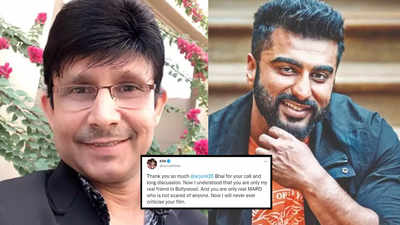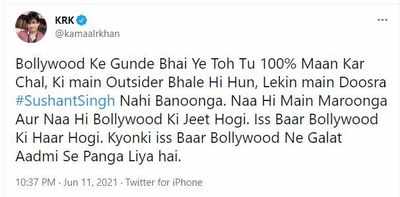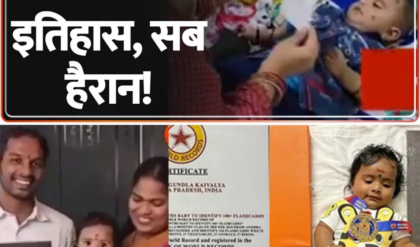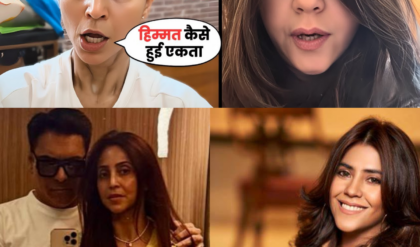“What Was Done to Sushant Could Have Happened to Me, That’s Why I Left Mumbai,” Says KRK
.
.

“What Was Done to Sushant Could Have Happened to Me, That’s Why I Left Mumbai,” Says KRK
Introduction
The tragic death of Bollywood actor Sushant Singh Rajput in June 2020 left the nation in shock and deep mourning. His untimely passing raised several questions, most notably regarding the circumstances surrounding his death, the mental health struggles faced by actors in the industry, and the dark underbelly of the film world. While the official investigation into his death is still a subject of legal debates, it opened the door to a broader conversation about the pressures faced by Bollywood actors, the industry’s toxic culture, and the murky connections between celebrity, power, and influence.
One person who has been vocal about these issues, particularly the darker side of Bollywood, is Kamaal R Khan, or KRK, as he is popularly known. A self-styled film critic, actor, and social media personality, KRK has built a reputation for making controversial statements and taking jabs at various Bollywood personalities. However, his comments on Sushant Singh Rajput’s death and his own personal decision to leave Mumbai in the aftermath of the tragedy have added another layer to his already contentious public persona.
In recent interviews and social media posts, KRK has been very candid about his experiences in the film industry, his views on Sushant’s death, and the reasons that led him to leave Mumbai, the heart of India’s entertainment industry. His statement—”What was done to Sushant could have happened to me, that’s why I left Mumbai”—has sparked considerable debate and curiosity. Was KRK simply being dramatic, or did he have genuine concerns about his safety and well-being? And, what does his departure from Mumbai reveal about the pressures faced by individuals in the Bollywood industry?
This piece explores KRK’s journey, his controversial comments, and the broader implications of his statement. We will examine the events that led to KRK’s departure from Mumbai, his experiences within the industry, and how his perspective on Sushant Singh Rajput’s death fits into the larger narrative about Bollywood’s power dynamics and mental health issues. Additionally, we will analyze the culture of fear, manipulation, and exploitation that has been associated with the film industry, and why many feel that the tragic events surrounding Sushant’s death are not isolated incidents, but part of a deeper, systemic problem.
The Rise of Kamaal R Khan: A Controversial Figure in Bollywood

Kamaal R Khan, or KRK, first gained attention in the early 2000s for his appearance in films such as Deshdrohi (2005), a movie that is often regarded as one of the most infamous flops in Bollywood history. Though he didn’t achieve success as an actor, KRK found his niche as a film critic, thanks to his controversial and often scathing reviews. Over time, he became a polarizing figure in the industry, with many either loving or despising his outspoken nature. His no-holds-barred criticism, especially when directed at high-profile celebrities, earned him a significant following on social media platforms like Twitter and YouTube.
KRK is known for his sharp and sometimes offensive remarks about Bollywood films and stars. His opinions are rarely tempered by diplomacy, and he often finds himself in the center of public controversies. From making controversial statements about big stars like Salman Khan, Shah Rukh Khan, and Akshay Kumar, to posting inflammatory comments on various social issues, KRK has been a figure who thrives on confrontation. His public feud with Salman Khan, in particular, gained much media attention when he accused the actor of harassment and claimed that he had been blacklisted from Bollywood as a result.
However, despite being a controversial figure, KRK has also become somewhat of an “anti-establishment” voice in Bollywood. He has often spoken about the nepotism, favoritism, and exploitation within the industry, voicing concerns about how outsiders and newcomers are treated by established stars and filmmakers. KRK’s critics argue that he is simply seeking attention and fame through his provocative statements. Nonetheless, his outspokenness has given him a platform where he can express his grievances and critique the Bollywood system.
The Aftermath of Sushant Singh Rajput’s Death

The death of Sushant Singh Rajput was a watershed moment for the film industry. On June 14, 2020, Sushant was found dead in his Mumbai apartment, and his death was initially ruled a suicide by hanging. However, the circumstances surrounding his death quickly became the subject of widespread speculation. Fans and some of Sushant’s close associates began questioning the official narrative, suggesting that he might have been murdered due to his growing influence in the industry and his possible involvement in uncovering the darker side of Bollywood.
A wide range of conspiracy theories began circulating, including claims of foul play, professional rivalry, mental health struggles, and corruption. What followed was a media frenzy, with numerous celebrities, journalists, and influencers coming forward with their own opinions about Sushant’s life and death. Many prominent personalities spoke out in support of Sushant, calling attention to the toxic atmosphere of the industry and how it adversely affected the mental health of actors.
Sushant was an outsider in Bollywood—someone who had made his way into the industry without the backing of a powerful film family. He had often spoken about his desire to carve out his own space in the industry and had even expressed disillusionment with the Bollywood establishment. His apparent openness about his struggles with mental health, combined with his criticism of the film industry’s practices, made him a target of both media scrutiny and possible professional retribution.
KRK, like many others, was vocal about the need for justice for Sushant. He criticized the film industry’s lack of support for the actor and pointed out how Bollywood often treats outsiders, especially those who do not conform to the industry’s expectations. In his social media posts, KRK echoed many of the sentiments that emerged in the wake of Sushant’s death, such as the need for transparency in the investigation and a deeper look at how the industry’s power structures contributed to Sushant’s mental distress.
KRK’s Statement: “What Was Done to Sushant Could Have Happened to Me”

KRK’s statement that “what was done to Sushant could have happened to me” is a significant one. For someone who has spent years critiquing Bollywood and calling out its unfair practices, KRK’s words suggest that he saw his own position in the industry as precarious. His decision to leave Mumbai—arguably the epicenter of the Indian film industry—further underscores his growing disillusionment with the film world. According to KRK, the very nature of Bollywood’s toxic culture, rife with power struggles, favoritism, and manipulation, could have put him in the same situation as Sushant.
KRK’s comments reflect a broader concern about the dark side of Bollywood. He has often spoken about how the industry can be unforgiving to those who do not conform to its unspoken rules. This includes people who speak out, challenge the status quo, or simply don’t fit the image that Bollywood’s powerful families and gatekeepers want to project. KRK himself has been a target of bullying and harassment in the past, especially after his public disagreements with Bollywood superstars. He has claimed that his outspoken nature, combined with his status as an outsider, made him a target of systemic exclusion.
Furthermore, KRK’s statement may also point to the struggles faced by individuals in the industry who are not part of Bollywood’s elite circle. Many actors, critics, and professionals who are not from powerful film families report feeling sidelined, marginalized, and even bullied by the industry’s top-tier stars, directors, and producers. For someone like KRK, who has never been a part of Bollywood’s inner circle, this exclusion could have serious personal and professional ramifications.
KRK’s decision to leave Mumbai, therefore, was not merely a personal choice, but an escape from an environment that he felt was toxic, threatening, and ultimately dangerous. His departure reflects a growing sentiment among many who have left the industry, either voluntarily or due to the pressures imposed by its exploitative systems. The death of Sushant Singh Rajput highlighted just how harmful the industry’s pressures could be, especially for those who were not born into it or did not play by its rules.
The Culture of Fear, Nepotism, and Mental Health in Bollywood

The culture of fear, manipulation, and exploitation that has been associated with Bollywood for years is a topic that has gained significant attention in the wake of Sushant Singh Rajput’s death. Sushant’s apparent struggles with mental health and his isolation from the industry’s inner circles have highlighted the challenges faced by many actors, especially those who do not come from film families.
Nepotism is another issue that has long been discussed within Bollywood, with many outsiders claiming that it is extremely difficult to break into the industry without connections. The harsh realities of competition, favoritism, and lack of opportunities for non-nepotistic actors have fueled resentment and disillusionment among many newcomers. In this environment, those who do not conform to the unspoken rules or fail to meet the industry’s unrealistic expectations often find themselves sidelined, both professionally and emotionally.
Mental health struggles are also a key issue. Bollywood’s intense pressure to maintain a perfect public image, perform well in films, and remain relevant in an industry dominated by stars can have a devastating impact on an individual’s psychological well-being. Sushant’s case, which highlighted his mental health struggles, served as a wake-up call for many, pointing to the need for greater mental health awareness and support systems within the industry.
Conclusion: The Personal and Professional Consequences of Bollywood’s Toxicity
KRK’s decision to leave Mumbai and his statement that “what was done to Sushant could have happened to me” underscores the precarious position many people, especially outsiders, face in the film industry. His words reflect the widespread concerns about the exploitation, manipulation, and mental health issues that are endemic to Bollywood, where power structures often prioritize favoritism, connection, and image over individual well-being.
While KRK’s reputation as a controversial figure makes it difficult to assess the full validity of his claims, his departure from Mumbai is yet another testament to the toxic culture within the industry. His comments provide a glimpse into the pressures faced by those who challenge Bollywood’s norms and expose the darker realities behind the glamour and glitz.
In the end, KRK’s experience—and the tragic story of Sushant Singh Rajput—highlights the urgent need for systemic change within the film industry. Bollywood must address its deep-rooted issues of nepotism, mental health, and exploitation to ensure that no more young, talented individuals are subjected to the same fate. Until then, the voices of those like KRK, who speak out against these injustices, will continue to ring loud, calling for a safer, more inclusive, and supportive industry for all.
News
Scandalous! Celebrity Caught in a Shocking Incident with a Fan in Public!”
Shocking Incident Involving Kareena Kapoor: A Fan Misbehaves in Front of the Media In a deeply unsettling incident, Bollywood actress Kareena Kapoor Khan found herself at the center of an unexpected and distressing situation when a fan reportedly touched her…
End of content
No more pages to load






